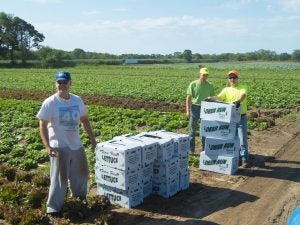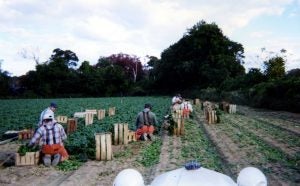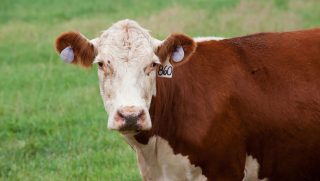Human history is marked by conflict. An aggressor lobs an opening salvo, and two parties bludgeon each other until a truce is brokered.
What sparked the clash? Irreconcilable differences. Motivations vary, but generally it’s a question of turf/resources — or ideology. One group proclaims superiority: Their sphere of influence must grow, and the depraved, morally bankrupt “other” must be stamped out.
I get that distinct vibe with organics.
Agriculture has been mired in a philosophical war for decades. One, the so-called establishment: multi-generational, legacy farmers, who practice conventional or industrial agriculture (a loaded term if there ever was one). The other, the counterculture, new entrants who espouse the merits of a “rediscovered” concept called organics.
Of course, there are exceptions to this typology, but it’s the general rule.
In time, other parties get drawn into the conflict. But in a climate of escalating ag tensions, is peaceful coexistence an option … or a pipe dream?

As a conventional farmer who defies most definitions of such (more on that later), I was willing to let bygones be bygones. But then I witnessed the casualties of this unprovoked war — the endless sniping, that mindset morphed from civilian to combatant.
At the grassroots policy level, my fellow “conventional” farmers and I would debate if we should support organic initiatives in our overall platform. They’re fellow organization members: Farm Bureau, commodity groups, etc., and most importantly, our community. We can’t have infighting — that just weakens us all. We’re all in the same boat and share the same interests.
Except that we aren’t, and we don’t.
Is organics looking to sabotage us from within? In my view, organic’s very existence insinuates something inferior and less sustainable about the competition’s product (namely, mine). I take umbrage at that. Most importantly, we didn’t start this conflict.
In the propaganda machine, organics and its allies are the de facto media darling. The sympathetic David vs. Goliath underdog. Conventional always seems to be on the defensive.
We know that organics is a statement of faith rather than an affirmation of safety, wholesomeness, or scientific rigor. In fact, it pains me to see state and federal funding for organic initiatives. Why invest in a system whose claim to fame is literally doing less with more; all by imposing an unnecessary doctrinal handicap? Similarly, the entire philosophy is sustained by shaky, non-fact checked inferences (that the industry makes no attempt to correct), like “pesticide free.” There is a long approved list that you can see for yourself.
Also consider the optics of the terms conventional/industrial. It’s overwhelmingly negative, despite the fact that conventional often utilizes crop rotation and other practices that organics supposedly “owns.”

I believe that any investment in organics seems insanely shortsighted. The population “bomb” (peak population coming around 2050) says we don’t have that luxury.
Though we’ve made great strides — the public is wising up to the organic hypocrisy — that doesn’t mean we’re prevailing (yet) in the PR war. Hearts and minds are infinitely harder to secure than territory. Indeed, we’re hung up on labels, brands, and systems; whatever places one on a pedestal slightly higher than the competition.
I’m not a fan of being pigeonholed as conventional. I proudly vouch for the integrity of my product, its safety, and its stewardship portfolio. There is no one size fits all approach to farming. Practices are situationally dependent. Your mileage may vary.
I suggest that we retire the terms organic (and even industrial) outright — address the smug superiority and unfair character assassination in a single stroke.
At my family’s farm, we draw from a diverse pool of knowledge and practice. I call it reconciliation agriculture. An elegant fusion of old standbys and emerging technology. For example, we use legacy pesticides that require the full ensemble of personal protective equipment. We also use biological pesticides that you could spray in the buff (not that I’d advise it). We use synthetic fertilizers that have been formulated to seasonally trickle, optimizing yields and minimizing leaching and runoff. We use hybrid seed, and salivate at the prospect of using biotech or gene-edited crops — if any were available.

We’re also a fifth generation family farm, not a corporation (another common smear against industrial), and an overwhelming proportion of our product is sold and consumed within a 50 mile radius. That’s a testament to our sustainability ethic.
We also know our limitations. No-till is one bona fide “industrial” farming exclusive — the use of biotech in conjunction with Roundup or similar herbicides. But even if we had herbicide tolerant crops at our disposal, it’s simply not compatible: the need for raised beds and the general architecture of vegetable root systems (compared to agronomic crops) renders no-till a no-go.
Bottom line, rigid devotion to ag systems is passé. By siloing, we neglect the merits of practices we might otherwise disregard, for no reason other than the sanctity of our inflexible “religion.” Reconciliation ag is a pragmatic, a la carte fusion that is flexible, site specific, and optimizes environmental, economic, and social outcomes for farmers and consumers alike.
There’s nothing proprietary or exceptional about organics. In this regard, I’m reminded of a well-traveled meme: “Organic farming, or as your grandparents parents called it, ‘farming’.” The only path to peaceful coexistence is to de-differentiate and break down artificial distinctions that pit farmer against farmer.
Tim Durham’s family operates Deer Run Farm — a truck (vegetable) farm on Long Island, New York. As an agvocate, he counters heated rhetoric with sensible facts. Tim has a degree in plant medicine and is an Associate Professor at Ferrum College in Virginia.



